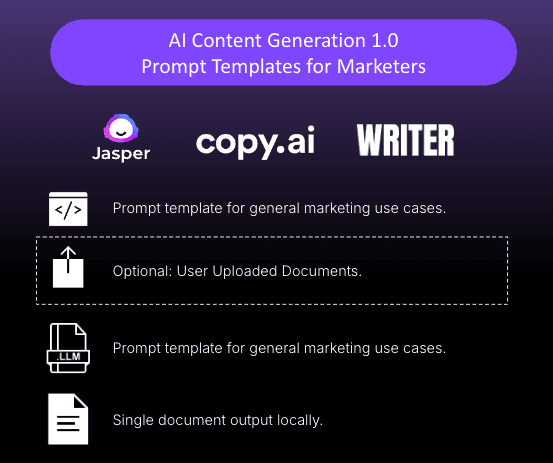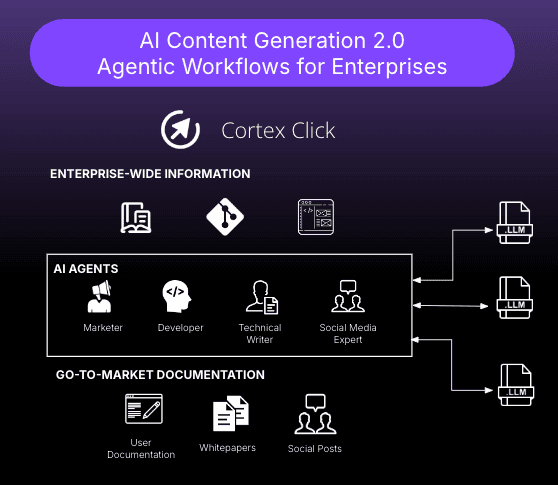Why Do LLM Writing Tools Suck So Much?
Evan Boyle
Launch Week at Cortex Click
This week we launched Cortex Click, a new platform for generating, editing, and publishing developer marketing content. Read on to learn more about why we built it, and why we believe it's a better approach to LLM-powered content creation.
If you’re anything like the dozens of CEOs, CMOs, and marketing practitioners that we’ve worked with over the last six months, combining the words “LLM-powered” and “developer marketing” in the same sentence (rightfully) strikes fear into your heart.
Just as spam became synonymous with unwanted emails, slop has quickly become synonymous with low-quality, AI-generated content. This poses a significant threat to the internet, even more so in developer marketing where user conversion hinges on trust and content that helps people get their jobs done quickly.

No one wants to see the internet polluted with slop
Yet, when applied thoughtfully, LLMs offer substantial benefits: higher output from your existing team, the ability to spread your message further, and more customers that get answers to their questions before bottoming out on support channels. This potential is driving an industry-wide scramble to make sense of the landscape.
For software companies, the question isn't whether LLMs are being used to generate marketing content, but whether it is happening in the open or in the shadows. With ChatGPT and Claude Pro subscriptions available for just $20 a month, you should assume that your marketing team is already using these tools day-to-day.
If we accept that LLMs are here to stay in developer marketing and that there is no going back, how do we move forward? How can we harness these tools safely, maximizing productivity and output quality while minimizing risks like customer dissatisfaction due to AI hallucinations?
Why the World Needs Better LLM Content Tools
The market for LLM content generation tools is both oversaturated and nascent. We’ve tested most of the 100+ LLM-assisted writing tools on the market, and we’re largely underwhelmed. At worst, these products are thin wrappers over ChatGPT, doomed to have their lunches eaten by Anthropic artifacts or other AI labs. At best, they are training their own models that underperform in comparison to state of the art foundation models by 25%+ on popular benchmarks.
We've identified several (anti) patterns along the way:
-
Low-quality fluff that screams “AI-generated”: The output from these tools is littered with buzzwords like “delve”, “demystify”, and “ever-evolving”. It may sound like a good thing, but if your 2,000 word blog post is generated in under a second, you should assume that the quality will be abysmal. Tools with these performance characteristics are using cheaper, faster models, and use one-shot as opposed to more sophisticated multi-agent workflows that can improve output quality by an order of magnitude.
-
Disconnected from your knowledge base: LLMs are statistical inference machines. This is commonly summarized as “garbage in, garbage out”. Taking a company’s disparate knowledge base of webpages, PDFs, GitHub repos, and docx files and turning it into clean, LLM-optimized content ready for retrieval augmented generation (RAG) is both extremely difficult, and the single highest ROI activity for improving the quality of LLM-generated content. We need quality input to get quality output.
-
Limited author control: Writing is a deeply personal activity. An LLM-generated draft is a useful jumping off point to solve the blank page problem, but from there the author must be in the driver's seat. Too many existing tools are entirely chat based, meaning that you issue a natural language command and the entire article is rewritten without the opportunity to approve the diff. This results in manual edits and changes made by the author getting overwritten or thrown out. Few products offer tools for governing generated content, such as controlling author and brand voice, setting rules about off-limit topics, or consistently applying specific formatting for patterns like tutorials.
-
Poor fit for developer marketing: Popular writing tools don’t handle code generation well and don’t render code blocks cleanly. Markdown is the lingua franca of both LLMs and marketing websites (think site builders like Hugo, GitBook, and Docusaurus), but most tools expect you to publish HTML or copy/paste plaintext output with lossy formatting rather than integrating with the most common developer marketing CMS: GitHub.

Cortex Click: The Intelligent Content Engine
Cortex Click is an intelligent content engine for generating, editing, and publishing developer marketing content. We believe that quality really matters in documentation, blogs, and marketing. To generate the highest quality content possible, we employ a three-pronged strategy:
- Grounding in your Knowledge Base: Cortex Click searches across your existing developer docs, blog posts, code examples, and other marketing materials to ground content generation, add cross-links, and match brand voice. Further, we automate the process of ingesting your knowledge base, and keeping it up to date so your audience is guaranteed the freshest content.
- Real-Time Web Research: To fill in any gaps, the workflow performs web research against popular search engines. This augments your knowledge base with access to additional code examples, industry trends, and other facts and statistics.
- Multi-Agent, Adversarial Workflow: All of this context is fed into multiple frontier models from different providers that are used in concert. We leverage the strengths of different models to plan, research, draft, review, and correct the content ultimately leading to a better result than could be achieved with any one model.

The platform offers an array of powerful features designed to optimize your content creation process:
- The LLM-driven content management system ('CMS'): A Markdown editor with delightful LLM-powered features to speed up content creation and editing. Generate a first draft from just a title and a few notes, make a combination of manual and targeted AI edits through prompting, and publish the final result in a pull request to your GitHub repo.
- Chat with your knowledge base: Use authenticated chat to brainstorm article ideas, iterate on social media copy, and answer questions about your product.
- SDKs and APIs for Developers: SDKs and APIs that allow you to extend the product and build custom experiences via the @cortexclick/cortex TypeScript SDK and public API. This includes tools for programmatic content generation and refinement, streaming chat, and automated ingestion of your knowledge base.
All of the above helps the first draft of whatever you're producing be more accurate and compelling. But writing is an iterative process, and a good copilot needs to help with that too. Cortex Click is built for draft number 2,3,4 and on:
- Editable in markdown
- Highlight and refine
- Version controlled
Watch the full product walkthrough to see the writing workflow in action:
We've found that the Cortex Click Intelligent Content Engine drastically cuts down the time to create quality technical content, and our customers see it too.
"SEO teams can cut content production time by 75% with Cortex Click."
-- Matt Bowers, SEO consultant and former head of SEO at Zapier and Zillow
Complex, technical products that take full advantage of our chat and content tools are able to activate customers faster:
"Cortex Click allows our team to scale technical content creation for our developer focused products with just one person using their generative AI platform."
-- Ethan Chan, CEO of Allium
Get Started For Free
Don't take our word for it. Sign up for a free trial today, no credit card required, and try it yourself. Once you've used your 1000 free credits, small teams can sign up for the pay-as-you-go plan with no monthly minimum commitments. See the pricing page for more details and the full list of plans for teams of all sizes.
